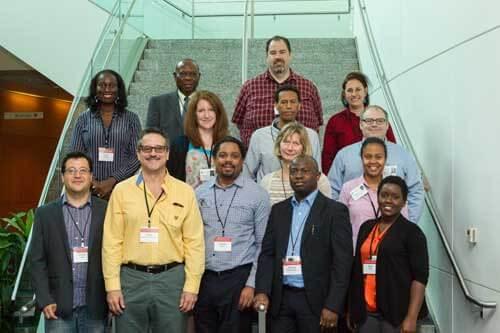Program Spotlight: CRCHD Mock Grant Review
, by CRCHD staff
The NCI Center to Reduce Cancer Health Disparities (CRCHD) held a Professional Development Workshop for its Continuing Umbrella of Research Experience (CURE) scholars on June 23-24, 2014, in Rockville, Maryland. As part of the workshop, attendees had an opportunity to observe and participate in a Mock Grant Review.
A mock grant review enhances young investigators' understanding of the grant review process. The workshop for CRCHD CURE scholars allows them to gain insight on what makes a successful grant application and to observe the grants process from submission to final decision.
This event was co-chaired by Dr. Carlos Federico Lopez, Assistant Professor of Cancer Biology at the Vanderbilt-Ingram Cancer Center in Nashville, Tennessee, and Dr. Taofeek K. Owonikoko, Associate Professor at Emory University in Atlanta, Georgia, along with Dr. Lynn M. Amende, Scientific Review Officer at the National Institutes of Health.
“The one great thing about a mock review is it gives you both a flow of information to help you understand how NIH grants are scored, and what it takes to craft a competitive application,” says co-chair Lopez.
“I was quite surprised how close to a real grant review the mock session turned out to be,” says Co-Chair Owonikoko. “It is instructive to see the similarity in the critiques and sentiments expressed by the reviewers. It is quite surreal to see how the suggestions and advice on writing an excellent grant impacts the reviewers. This is a valuable experience to count on for my next grant submission.”
Kurt Richard Weiss, M.D., NCI/CRCHD-funded CURE K08 grantee, was watching a mock review and attending a CRCHD professional development conference for the first time. He commented that he “…was extraordinarily impressed with how streamlined and direct the NIH review process was and it left me knowing what I have to do make my grant applications a success.” Weiss is an orthopedic surgeon and assistant professor at the University of Pittsburgh Medical Center.
"The Mock Grant Review was an eye opener for me” says Crystal Lumpkins, Ph.D., of the University of Kansas Medical Center who participated as a mock reviewer and is a NCI/CRCHD supported grantee. “The process demystified a lot about the review process and also gave me an opportunity to see what actually goes on behind the scenes. It was a bit intimidating at times, however it was an experience that will help me when preparing to write my next grant application. I think that every person who is going to apply for a grant should participate in a Mock Review. From the incorporation of an actual Scientific Review Officer (SRO) to the requirement to review actual grant applications, the Mock Grant Review was well executed and gave me a boost of confidence in the review process. "
Obtaining an NCI/NIH grant is both an “arduous and challenging process” says NIH SRO Lynn M. Amende, Ph.D., who participated in CRCHD’s Mock Review. Last year, NIH received more than 85,000 grant applications were submitted. Approximately $29-billion in grants were funded.
The art of grant writing to some is like learning to play classical violin for a symphonic orchestra. It is not an overnight process. It can take years to be a good grant writer. A great deal of patience is required.
“The difference in being funded or not can make all the difference on a grant applicant’s permanent career at a major university and whether they are promoted from an assistant professor to associate professor,” Amende says. “This is why mock grant reviews are so important.”
“You learn about the grant process from two perspectives —the applicant and the reviewer/scorer of the grants,” says Amende. “It’s a little like having the perspective of a driver in a car when a person suddenly walks in the middle of the road, or the perspective of a pedestrian when he sees a car speeding towards him…it can be very unnerving,” she added. The learning curve can be precipitous.
“Sometimes a grant applicant will take on a project larger than he can possibly finish and its best to make the one big grant application into two,” says Lopez. “Other times you will find that your grant application is not so original and has been studied a thousand times before, or there are flaws in the study’s design.” Nevertheless, good ideas get funded. A lot falls on whether the person with the good idea has the scientific know how to carry the plan out or the right collaborators. The institution the grantee works for itself must have robust state-of-the-art technology to carry out elaborate scientific hypothesis.
The reviewers at the mock grant review are expert scientists in their particular field. Like a real grants review, the mock reviewers often had a wide range of scoring opinions. While one reviewer may give a grant application a “1” or best score, other reviewers might give the same grant a much lower score.
“There could be a discipline of study on the culture of reviewers and grant reviewing alone,” Lopez says.
“Prior to the mock review, I did not have great understanding about how grant review discussions proceeded,” says Paulette Chandler, M.D., M.P.H., Assistant Professor of Medicine, Brigham and Women’s Hospital, Harvard Medical School.
“The mock review exercise was a rich learning experience. I enjoyed reading the grants assigned to me and critically evaluating them for impact, innovation, and strengths and weakness. While reading the grants, I enjoyed learning more about the science of a variety of cancer-related areas,” Chandler says. She added, “reading the grants in advance and preparing a rigorous evaluation of the quality of the grant based on impact, innovation, and science also forced me to rigorously think about the qualities of a strong grant.”
Resources:
- Learn more about CRCHD's CURE program.
- Learn more about CRCHD's Diversity Training branch.
- NIH Guide: Writing Your Application
- CRCHD Tips & Tools for Applying to Grants
